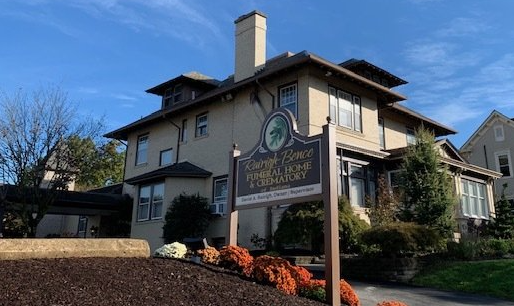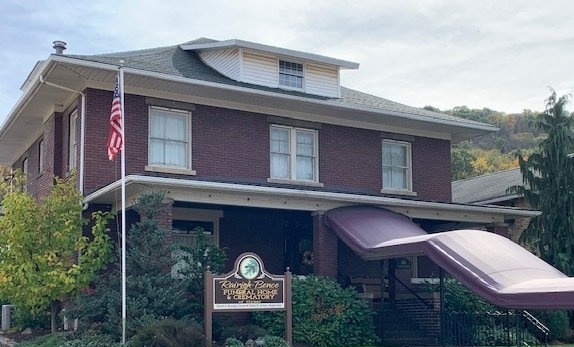For Immediate Service, 24 Hours a Day,
Call
724-349-2000
or
724-254-4342
FAQ: Cremation Services
-
How long must we wait after their death before we can cremate a family member?
Unlike burial, cremation is irreversible. This requires us to be "extra diligent" in obtaining cremation authorization from the legally identified next-of-kin, as well as those from any necessary agencies (such as the county coroner). During these 24 - 48 hours (24 hours is the mandated waiting period between death and cremation in Pennsylvania) the deceased will be held in a secure, refrigerated environment at Rairigh-Bence Funeral Home & Crematory.
-
How much will I have to pay for the cremation?
When you enter into a discussion with us about the cost of your loved one's cremation, whether on the phone or in-person, we are legally obligated to share our General Price List, or GPL, with you. That list details the actual cost of our cremation services, which is a combination of our basic professional services fees and any additional charges related to the transportation and safekeeping of the deceased prior to the cremation. Our price for Direct Cremation is $ 2,000. Other fees are also involved and will be discussed when you contact us. We are always willing to work with a family if our listed price is not within their budget. Financial hardship discounts for direct cremation are available.
-
Can I participate in the cremation?
Generally speaking, the answer is yes. Please let us know how you or members of your family would like to be involved in the cremation process of your loved one. We will discuss ways that we can respectfully accomodate your wishes.
-
Can I purchase an urn from another source, or must I buy one from you?
The FTC's Funeral Rule guides funeral directors in the ethical and fair presentation of funeral service options. The purchase of a cremation urn (or a casket, for that matter) from second or third party sources is one of the rights that the funeral Rule guarantees. Rairigh-Bence Funeral Home & Crematory cannot prevent you from, nor can we charge you an extra fee for, the purchase of a third-party cremation urn. You are not required to be present for the delivery of the urn to the funeral home.
-
What should I do with my loved one's ashes?
The Commonwealth of Pennsylvania views the act of cremation as the final disposition. That is why you have many different options regarding how cremated remains are handled. In our area, we still have many families that choose to bury or entomb cremated remains at a local cemetery. Some families take cremated remains home to scatter them on their own property, while others purchase ornamental urns to keep cremated remains in their home. Urns are available for each scenario listed above: burial, scattering and keeping cremated remains in a home. Smaller keepsake urns and cremation jewelry items are available if the cremated remains are to be separated among family members. (Please note that the Roman Catholic Church permits cremation, but only if the cremated remains are kept altogether and buried or entombed in a cemetery). If you're curious about your options, just give us a call. We'll share what we know.
-
If we choose cremation, does my loved one have to be embalmed?
Embalming is not required for Direct Cremation. However, if you plan to have a public visitation and/or funeral service with the body present prior to cremation, embalming will be required. Under the FTC's Funeral Rule, we cannot provide or charge for embalming services without your permission.
-
How long will it take to cremate my family member?
Usually it takes 2 ½ to 3 hours for the cremation process. The overall size of the person being cremated is a determining factor in the length of time it takes for cremation. Following the cremation, a one hour cool-down period follows. Afterwards, the cremated remains are processed for a uniform appearance. Certainly, if this issue is important to you, we urge you to speak with one of us at Rairigh-Bence Funeral Home & Crematory.
-
What kind of fuel is used in the crematory?
Answer: The Rairigh-Bence Funeral Home & Crematory uses natural gas with it’s crematory.
-
Are people dressed when they are cremated?
You'd be surprised how often we hear this question! Some people might choose to be undressed so as to 'go out' the same way they 'came in' to the world; but most of the time, the deceased is dressed in the clothing they've selected prior to their death, or chosen by family members after their passing.
-
Can we put special items in their cremation casket?
It depends upon what you mean as "special", but we do our best to accommodate the wishes of surviving family members. Most commonly, families will ask to place notes, children's drawings, or other personal messages of love; but we've certainly had some unusual requests (such as the inclusion of golf balls, baked goods and other treasured keepsake items). Of course we have to be careful with what we permit to be placed in our crematory. We encourage you to speak with one of our funeral directors to learn what items would be allowed to be placed in a casket or cremation container prior to cremation in our crematory.
-
Does this mean we don't need to plan a commemoration service?
Certainly not; cremation merely describes the type of physical end-of-life care you intend to provide your loved one. A commemoration service is for the living; the individuals emotionally impacted by the death deserve the same level of compassionate attention. And one of the benefits of cremation comes from the larger "window-of-opportunity" in which to plan a meaningful celebration-of-life it provides the surviving family members. We can guide you in making all the necessary service arrangements
-
I'm thinking of placing my loved one's ashes in the care of a local cemetery. What is the difference between a columbarium and a mausoleum?
A mausoleum is a free-standing building which is intended as both a monument as well as the final resting place for both caskets and cremation urns. Caskets are entombed in mausoleum crypts, while cremation urns are entombed in a niche. Newer mausoleums are constructed to accommodate both caskets and cremations urns. A columbarium is the same in purpose, but not in design. Instead of crypt spaces large enough for full-size caskets, a columbarium is much smaller than a mausoleum and features smaller niche spaces that accommodate one or two cremation urns. Columbariums are often located in cemetery sections that have been designated for the final disposition of cremated remains.
-
Can you tell us which type of service is right for us?
We would never presume to tell you which service is best for you or your loved one. We will be pleased to discuss the service options that are available to you, keeping in mind you and your loved one’s wishes (if they are known), the overall cost of each service option and any religious influence regarding final disposition. We will explain the differences between service formats (traditional funeral, direct cremation, memorial service following burial or cremation and celebration-of-life), and discuss meaningful services that you and your loved one may have experienced during your lives. Hopefully, this discussion will help you to arrive at a final decision all on your own.
-
What "extra" fees or charges will I need to pay?
In addition to the cost of cremation, there may be charges for the use of a facility for a visitation or gathering, a memorial service or graveside service, merchandise items such as: cremation urn; cremation vault; cremation jewelry; printed materials like a guest book, memorial cards, thank you cards and obituary laminations. Outside Cash Advance Charges would be for: certified copies of the death certificate; coroner’s cremation authorization; cemetery fees, newspaper obituaries, clergy, musician and church fees, luncheon or catering and flowers. (Not all of these fees would be associated with every cremation service.)
-
What are "cash advance items"?
During our initial meeting we will discuss the charges of outside vendors and service providers. These are known as Cash Advance Charges. Here is a list of the most common Cash Advance Charges that appear on a funeral purchase agreement: Certified copies of the Death Certificate; Coroner's Cremation Authorization, Cemetery fees; Clergy/Church fees; Organist/Musician fees; Florist charges, Newspaper Obituary charges, Hairstylist fees. The funeral home will pay these service providers on your behalf, however, payment for these Cash Advance Charges are due within 72 hours of the signed contract. The funeral home does not profit from any Cash Advance Charges.
-
Why must I pay for these items at the time of arrangement?
The answer to this is simple: we have to pay for these second-party services at the time we make the purchase on your behalf. This requires us to ask for payment for all cash advance items at the time the cremation service contract is signed, or paid within 72 hours of the signed contract. For more specific information about our payment policies, open “Payment Options” under the “Funeral Planning” tab, or call us to speak with one of our funeral directors.
-
Can we arrange to bury their ashes on cemetery grounds?
In short, yes you can. It is still very popular in our area for cremation urns to be buried in a cemetery. Most of our local cemeteries permit cremated remains to be buried on top of existing graves. This is beneficial for people who want to be buried with family members when there are no vacant cemetery lots available in the family section. Some cemeteries require cremation urn vaults for burial. We often recommend cremation urns that are made for in ground burial.
-
What must I bring to the funeral home?
You'll need to provide the documents/information required to complete your loved one's death certificate and obituary. If you are planning to have a service, you may also wish to bring in a collection of family photographs to be used in making a tribute video or to set up around the funeral home, church or service location. Other items may be needed at some point, depending on the arrangements made. Please click on the “Funeral & Cremation Planning” tab and open “What Should You Bring to Our Initial Meeting”. It will provide a detailed list of the information you will need for us to complete a death certificate and help write an obituary.
-
I'd like to write my loved one's obituary. Can I?
Of course you can; in fact any member of your family (or even a close friend) can "step up" to take care of this task. There are many valuable resources available in the Guidance section of our website, including tips on writing an obituary. And you can always turn to us for assistance.
Rairigh - Bence Funeral Home & Crematory
of Indiana
965 Philadelphia Street
Indiana, PA 15701
Email: rairighfd@gmail.com
David A. Rairigh, Owner/Supervisor
Rairigh - Bence Funeral Home & Crematory
of Clymer
655 Franklin Street
Clymer, PA 15728
Email: rairighfd@gmail.com
David A. Rairigh, Owner
Taylor S. Allison, Supervisor
Proudly Serving the Communities of Indiana County and surrounding areas: Indiana, Clymer, Homer City, Marion Center, Penn Run, Dixonville, Ernest, Heilwood, Brush Valley, Kent, Lucernemines, Creekside, Commodore, Home, Starford, Shelocta, Cookport, McIntyre, Alverda, Aultman, Kenwood, Clarksburg, Diamondville, Iselin, Prosperity Hill, Clune, Graceton, Barr Slope, Coal Run, Pine Flats, Jacksonville, Purchase Line, Chevy Chase, Glen Campbell, Red Barn, Chambersville, Hillsdale, Waterman, Buck Run, Blacklick, Marchand, Nicktown, Parkwood, Strongstown, and Mentcle



